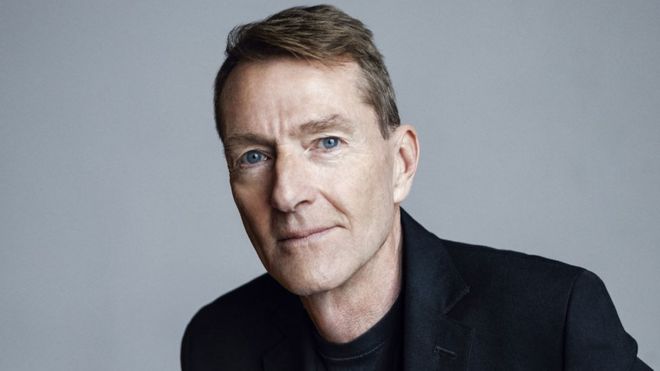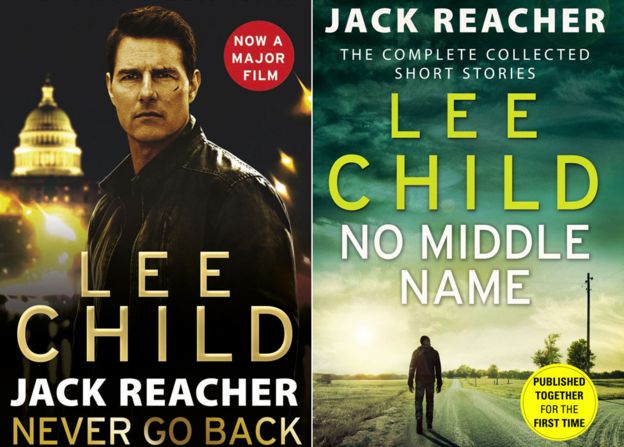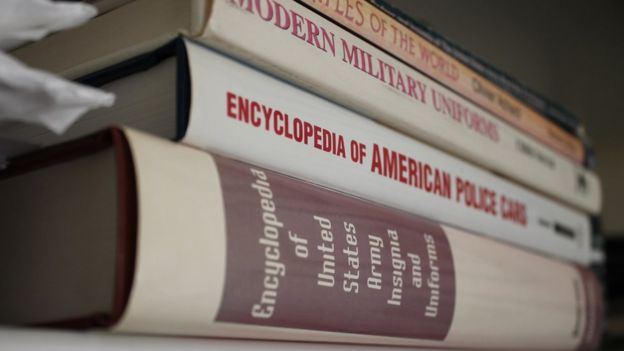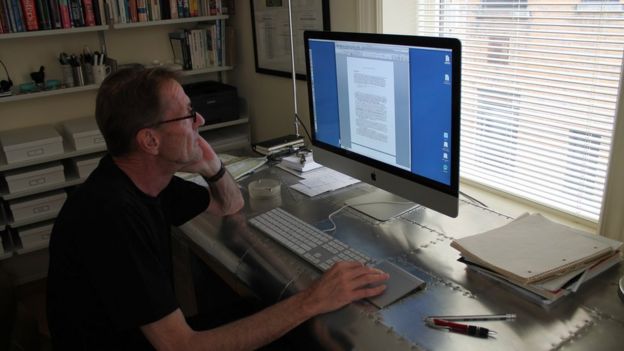 AXEL DUPEUX
AXEL DUPEUX
In a New York apartment offering spectacular views of Central Park, Lee Child, author of the Jack Reacher novels, stares out at a brick wall.
The positioning of his writing room is a typically disciplined move from the Birmingham-raised author, who in the 1990s faced up to redundancy from Granada TV by writing a novel.
Twenty-three years on from Killing Floor - the first Jack Reacher story - his thrillers are a publishing phenomenon, dominating the fiction charts, sparking film adaptations starring Tom Cruise, and enthralling millions of fans.
For the BBC World Service In the Studio series, Child allowed access to his writing room to record the first three days' work on his next novel - which he revealed will be titled Yesterday and will fill in some of the intriguing gaps surrounding Reacher's father.
 TRANSWORLD
TRANSWORLD
Child's latest novel will begin differently from his previous releases. The all-important first paragraphs, he says, will depart from his famously clipped style.
He says he will let the words breathe with a longer than usual introductory sentence marking the end of summer, the migration of birds and a list of States charting Reacher's planned diagonal journey across America.
Then a five-word hook - "He didn't get very far" - drags the reader back into his dangerous world.
The novel will be the 23rd Reacher adventure, after the release of The Midnight Line in November 2017.
"Someone like me is never going to win the Nobel prize… this is not admired literature, this is entertainment," says Child.
"A novel has a huge number of competitors now - the internet, video games, streaming movies.
"I'm trying to visualise a 25-year-old person somewhere in the world.
"They have a lot of choices and the book has to earn its place. You've got to suck them into that story."

Child's willingness to expose a work in progress is rare among authors.
When asked why he's prepared to take questions from a radio journalist while he's concentrating on writing, his answer suggests that, as one of the world's best-selling authors, he feels a little like an ambassador for the popular.
"People who do literary fiction well, I know some of them. They are delightful, smart people with absolutely no issues at all about what I'm doing," he says.
"It tends to be the kind of third-rate people or some of the second-rate critics that get all sniffy about it. This is a way of saying: 'Yeah - shut up.'"
Paternal theme
By day two, Child has reworked his opening paragraph enough to provide a launch pad for the rest of the novel.
There will be a contemplative tone, he says. But despite the paternal theme he resists the suggestion he's been influenced by the death of his own father in 2016.

With his opening paragraph locked, he now begins a free-wheeling descent into the plot, which could seem a terrifying way to work for novelists who are used to story charts and planned character arcs.
With little idea where his story is heading, Child says he feels like a movie stuntman on the ledge of a tall building.
"What I have to do is fall off, and I'm hoping that the movie crew is going to manoeuvre the safety airbag into position at the side of the landing just in time.
"I hope to land softly, but I cannot guarantee that right now."
Fittingly for the creator of no-nonsense ex-military cop Reacher, Child is keen to suggest that while he wants to defend his genre, he does not want to sound pretentious.
He has an audience, and he wants to give them as fun a ride as possible.
As a writer of thrillers, he may never be embraced by some literary critics. But he believes well-crafted popular fiction serves a profound purpose, rooted in our earliest history.
"At some point we began telling stories about things that had not happened," he explains.
"This made people feel emboldened or empowered and just a little bit more self-confident, which would help them survive.
"You are shown the edge of the cliff, but you're told you don't have to fall off."
In the Studio with Lee Child can be heard on the BBC World Service at 11:30 GMT on 31 October. Yesterday is due for publication at the end of 2018.

Follow us on Facebook, on Twitter @BBCNewsEnts, or on Instagram at bbcnewsents. If you have a story suggestion email entertainment.news@bbc.co.uk.

Không có nhận xét nào:
Đăng nhận xét